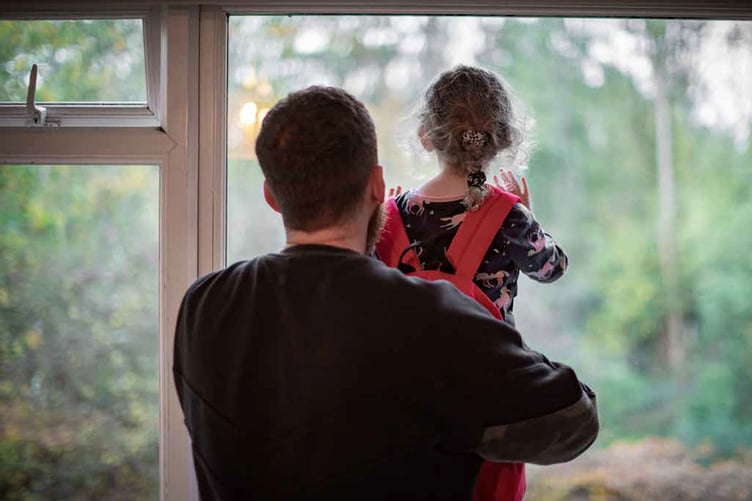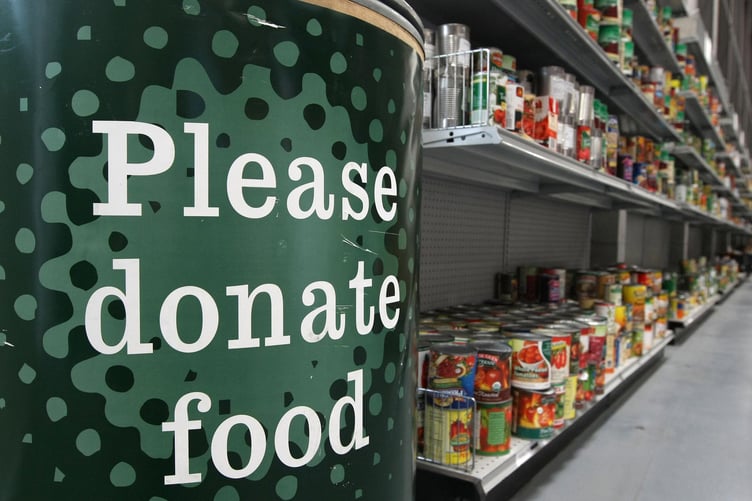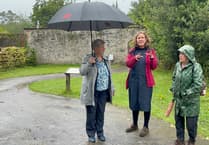Families are being ‘pushed to the brink’ as report lays bare a “troubling” picture of severe hardship in communities across Wales.
In a fresh report, Trussell – a UK food bank charity – has painted a bleak picture of poverty and hardship in Wales, with the charity warning that “no progress” has been made in tackling the issue since 2023.
Trussell’s ‘Hunger in Wales’ report, released on 10 September, estimates that over 660,000 people in Wales faced hunger in 2024 due to lack of money while nearly a third of people referred to food banks in the Trussell community in Wales are in working households.
The charity said that the latest figures show that paid employment in Wales “no longer protects people from hardship.”
The charity warned that that severe hardship is being ‘normalised’ as millions of people in the UK are on the brink of hunger without turning to a food bank or charitable food provider, and having to go without essentials like food or heating as a routine part of life.
Trussell has called on all political parties in Wales to commit to working to end the need for food banks ahead of next year’s Senedd elections, alongside urging the UK government to urgently strengthen social security and deliver on manifesto commitments to end the need for emergency food.
The problem is stark across Wales, and while the report carries only Wales-wide figures, in Ceredigion last year the county experienced a record high In 2024, with 27 per cent of children living in relative poverty, representing more than 2,700 of the county’s children.
Overall, Ceredigion faces increasing poverty rates, with figures showing a nearly one-third increase in households experiencing poverty between 2018 and 2022.
Figures from the Department for Work and Pensions showed 4,565 children under 16 in Powys were living in relative poverty in the year to March – up marginally from 4,475 the year before.
It meant 22 per cent of children in the area were in households whose income was below 60 per cent of the average income.
In Gwynedd, 23.6 per cent of children were in relative poverty in the year ending April 2022, while 35 per cent of all households earned below 60 per cent of the UK median wage.
In 2022/23, around 23.7 per cent of children in Pembrokeshire were living in relative low-income families, the sixth highest rate in Wales.
Pembrokeshire had the fifth highest rate of absolute child poverty in Wales in 2022/23, at 19.9 per cent.
In Carmarthenshire, 30.7 per cent of households were living in poverty according to the latest Welsh Government data.
Over 10,000 children in the county are living in poverty.

The report finds that very low incomes are the main driver of growing hunger and food bank need in Wales.
“Overwhelmingly, this is caused by flaws in the design and delivery of the social security system, compounded by too many jobs being inaccessible, insecure and not paying enough to cover essential living costs,” the report outlines.
The survey of people referred to food banks revealed that people at food banks in Wales are being left with just £89 a week after housing costs – to cover essentials like food, utility bills, travel for work or school, and toiletries like shampoo and toothpaste.
That figure is just 15 per cent of what the average household in Wales has left after rent or mortgage.
“Too often, social security isn’t providing the protection people need when work doesn’t pay,” the report adds.
“The majority (77 per cent) of people in working households in Wales who have needed to turn to food banks also receive Universal Credit to top up their income.

“Gaps in support systems are leaving too many people falling through the cracks, with over a third of people facing hunger saying they have not accessed any formal advice or support before having to use a food bank.
“This includes support around mental health, debt, housing and employment.”
As well as working households, single parent families are at high risk of needing to turn to a food bank for support.
They make up three per cent of households in Wales but 19 per cent of households referred to food banks in the Trussell community.
Trussell says this is “just the tip of the iceberg”, as the research also shows many people don’t access charitable food provision despite needing it.
The report says there has been “no real progress on food insecurity in Wales” since its last report published in 2023.
Figures show that in 2024, 660,000 adults experienced food insecurity in Wales, compared to 670,000 adults in 2022.
This means a quarter of adults in Wales at some point in the previous year ran out of food and were unable to afford more.
The report adds that “despite falling inflation levels, the use of charitable food provision remained unacceptably high in Wales.”
Figures show that one in 14 (seven per cent) households in 2024 used at least one type of charitable food provision in the previous year.
In 2022, this figure was six per cent.
Despite the increased use, more than half (54 per cent) of people who experienced food insecurity did not turn to any form of charitable food provision last year, the report found.
Katie Till, policy manager in Wales at Trussell, said: “Hunger and hardship are increasingly seen as a normal part of everyday life in Wales, with working people and families with children being hit particularly hard.
“We need to see urgent change, now. Our nation should not be seeing one in four (24 per cent) families with children in food insecure households.
“This is not an inevitable trend, but the result of systems that urgently need updating – particularly our social security system.
“It isn't right that so many people in Wales from all walks of life – including pensioners, disabled people, working families, and carers – are struggling to make ends meet.
“Nobody in Wales should face hunger.
“Both the Welsh and UK governments need to keep their word and ensure every child has the best possible start in life and that that everyone has the dignity of being able to put food on the table.
“This research is the benchmark against which they will be judged.”
Trussell says the next Welsh Government must ensure funds are available for people facing financial crisis, to prevent an adverse life event like ill health, redundancy, or a bereavement from pushing people into hardship and to the doors of food banks.
The charity says the UK government needs to take bolder steps towards ensuring Universal Credit at least covers the cost of essentials and is calling for urgent action this autumn.
This includes axing the cruel two-child limit, which would make a considerable dent in hunger in Wales.
Trussell is also calling for increased housing support for private renters on low incomes to keep up with the real cost of rents – as the policy of freezing support risks driving even more into hunger and homelessness.
“There are further changes that would create an even larger step-change in the incomes people live on, such as the introduction of an Essentials Guarantee into Universal Credit, to ensure social security payments cover the cost of the essentials we all need to get by,” the report adds.
Earlier this month a cross-party commission including former welfare ministers urged the UK government to scrap the two-child benefit limit as part of an ambitious “once in a generation” plan to lift millions of people out of poverty.
The Poverty Strategy Commission said billions of pounds of investment – including a boost to the rate of universal credit – was needed to reverse record levels of poverty in the UK, and tackle longstanding failures over rising hardship and destitution.
The UK government has so far resisted scrapping the two-child limit on cost grounds – estimated at £3bn a year – despite widespread opposition from Labour backbenchers, and anti-poverty campaigners.
The latest figures from the Department for Work and Pensions show 22 per cent of people in Wales live in relative poverty after housing costs, a figure described as “disappointing” by the Bevan Foundation who said it showed that “no progress is being made in reducing poverty”.
The Welsh Government says it has spent £5 billion to tackle poverty over the last few years including providing emergency assistance grants, introducing Universal Free School Meals for primary school children and working to develop a ‘Welsh Benefits System’ which makes it easier to access the different grants the Welsh Government provides to low-income households.
Despite that work, the Children’s Commissioner and a number of other organisations have said they are “deeply disappointed” the Welsh Government has not developed a robust action plan with measurable targets to reduce child poverty.
In a recent report the Joseph Rowntree Foundation forecasts that Wales will have the highest poverty and child poverty rates of the UK nations in 2029 without further action.
In its report Trussell urges for action to be taken with the risk of hunger and being forced to use food banks remaining “stubbornly high” across Wales.
In the charity’s report, co-Chief Executives of Trussell, Emma Revie and Matthew van Duyvenbode said: “Every week, food bank volunteers meet people who are being pushed to the brink – and left exhausted, isolated and without enough money for the essentials.
“This report shows how widespread those experiences are and how pervasive the situation has become.
“The findings don’t make for easy reading.
“The twin threats of the Covid-19 pandemic and immediate cost of living crisis may be receding, but this report paints a troubling picture of severe hardship in communities across Wales.
“Hundreds of thousands of people experienced food insecurity in Wales in 2024, with little sign of progress since 2022 – driven by a social security system that’s not fit for purpose, a lack of advice and support, and work that isn’t decent, secure or adequately paid.
“Severe hardship is becoming normalised across society, with concerning signs of people routinely having to go without essentials.
“The risk of hunger, and being forced to turn to food banks, remains stubbornly higher for some groups of people.
“Disabled people, families with children, and renters are all more likely to face hunger than others.
“We see how the structural inequalities people face because of their condition or impairment, ethnicity, gender, sexuality, or experience of care, intersect to increase the risk of hunger.
“This isn’t a Wales any of us want.
“The public overwhelmingly wants a just and compassionate society, one where no one needs a food bank to survive.
“And that’s where we find hope.
“Progress is possible.
“Within this report are the insights, evidence and solutions we need to build the future we want for everyone in Wales.
“We know what’s pushing people to food banks and, for the first time, this report shows what has helped some people out of severe hardship.
“So, we know what needs to change.
“The evidence is clear that hunger in Wales is not a food problem; it’s an income problem.
“If we’re to end the need for food banks, we must make sure people have enough to live on.
“We need an updated social security system, secure and rewarding jobs, affordable homes, accessible, joined up services, and supportive communities.
“The responsibility to tackle these issues sits across governments in Westminster and Cardiff Bay; we won’t see the change we need without action from both governments.
“The Welsh Government has a vital role and must step up.
“With Senedd elections just around the corner in 2026, we have an opportunity for change.
“Any party serious about governing in Wales must be willing to grasp the nettle, and commit to renewed efforts driven by Welsh Government to turn the tide of severe hardship damaging lives, communities, and the economy.
“There is hope – and an emerging route to a Wales without the need for food banks.
“We must not stop until we get there.”


.jpeg?width=209&height=140&crop=209:145,smart&quality=75)


Comments
This article has no comments yet. Be the first to leave a comment.